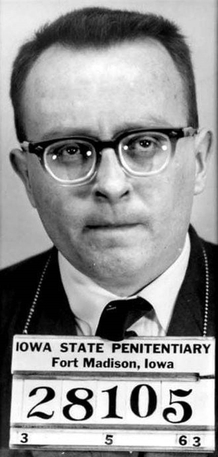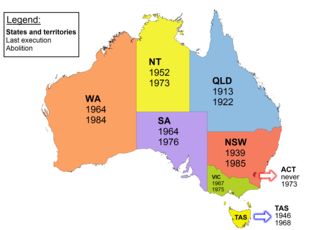Related Research Articles

In the United States, capital punishment is a legal penalty throughout the country at the federal level, in 27 states, and in American Samoa. It is also a legal penalty for some military offenses. Capital punishment has been abolished in 23 states and in the federal capital, Washington, D.C. It is usually applied for only the most serious crimes, such as aggravated murder. Although it is a legal penalty in 27 states, 20 states currently have the ability to execute death sentences, with the other seven, as well as the federal government, being subject to different types of moratoriums.
Capital punishment is a legal penalty in the U.S. state of Utah.

Capital punishment was abolished via the legislative process on May 2, 2013, in the U.S. state of Maryland.

Victor Harry Feguer was a convicted murderer, and the last federal inmate executed in the United States before the moratorium on the death penalty following Furman v. Georgia, as well as the last person put to death in the state of Iowa. While the media did not pay much attention to Feguer or his execution at the time, Timothy McVeigh's execution sparked renewed media interest in him.
Capital punishment in Canada dates back to Canada's earliest history, including its period as a French colony and, after 1763, its time as a British colony. From 1867 to the elimination of the death penalty for murder on July 26, 1976, 1,481 people had been sentenced to death, and 710 had been executed. Of those executed, 697 were men and 13 women. The only method used in Canada for capital punishment of civilians after the end of the French regime was hanging. The last execution in Canada was the double hanging of Arthur Lucas and Ronald Turpin on December 11, 1962, at Toronto's Don Jail. The National Defence Act prescribed the death penalty for certain military offences until 1999, although no military executions had been carried out since 1946.
Capital punishment was abolished in 2019 in New Hampshire for persons convicted of capital murder. It remains a legal penalty for crimes committed prior to May 30, 2019.
The Iowa State Penitentiary (ISP) is an Iowa Department of Corrections maximum security prison for men located in the Lee County, Iowa, community of Fort Madison. This facility should not be confused with the Historical Iowa State Penitentiary, which was shut down in 2015 after being open for 175 years. The HISP itself was a 550-person maximum security unit. Also on the complex was a John Bennett Correctional Center - a 169-person medium security unit. The HISP included two minimum-security farms with about 170 people who were located within a few miles of the main complex. The complex also had a ten-person multiple care unit, and a 120-bed special-needs unit for prisoners with mental illness or other diseases that require special medical care. In total, there were about 950 inmates and 510 staff members.
Capital punishment was abolished in Virginia on March 24, 2021, when Governor Ralph Northam signed a bill into law. The law took effect on July 1, 2021. Virginia is the 23rd state to abolish the death penalty, and the first southern state in United States history to do so.

Dustin Lee Honken and Angela Jane Johnson are American mass murderers convicted of the 1993 murders of five people in Iowa.

Capital punishment in Australia has been abolished in all jurisdictions since 1985. Queensland abolished the death penalty in 1922. Tasmania did the same in 1968. The Commonwealth abolished the death penalty in 1973, with application also in the Australian Capital Territory and the Northern Territory. Victoria did so in 1975, South Australia in 1976, and Western Australia in 1984. New South Wales abolished the death penalty for murder in 1955, and for all crimes in 1985. In 2010, the Commonwealth Parliament passed legislation prohibiting the re-establishment of capital punishment by any state or territory. Australian law prohibits the extradition or deportation of a prisoner to another jurisdiction if they could be sentenced to death for any crime.

Capital punishment in Michigan was legal from the founding of Sault Ste Marie in 1668 during the French colonial period, until abolition by the state legislature in 1846. Michigan is one of three U.S. states never to have executed anyone following admission into the Union. The federal government, however, outside Michigan's jurisdiction, carried out one federal execution at FCI Milan in 1938.
Capital punishment in Connecticut formerly existed as an available sanction for a criminal defendant upon conviction for the commission of a capital offense. Since the 1976 United States Supreme Court decision in Gregg v. Georgia until Connecticut repealed capital punishment in 2012, Connecticut had only executed one person, Michael Bruce Ross in 2005. Initially, the 2012 law allowed executions to proceed for those still on death row and convicted under the previous law, but on August 13, 2015, the Connecticut Supreme Court ruled that applying the death penalty only for past cases was unconstitutional.
Capital punishment in Georgia was completely abolished on 1 May 2000 when the country signed Protocol 6 to the ECHR. Later Georgia also adopted the Second Optional Protocol to the ICCPR. Capital punishment was replaced with life imprisonment.
Rhode Island was one of the earliest states in the United States to abolish capital punishment, having abolished it for all crimes in 1852. The death penalty was reintroduced in 1872, but it was never carried out before being abolished again in 1984. Of all the states, Rhode Island has had the longest period with no executions, none having taken place since 1845.
Capital punishment was abolished in Colorado in 2020. It was legal from 1974 until 2020 prior to it being abolished in all future cases.

Capital punishment was outlawed in the State of New York after the New York Court of Appeals, the highest court in the state, declared in 2004 that as currently practiced it was not allowed under the state's constitution. However certain crimes occurring in the state that fall under the jurisdiction of the federal government are subject to the federal death penalty.
Capital punishment, more commonly known as the death penalty, was a legal form of punishment from 1620 to 1984 in Massachusetts, United States. This practice dates back to the state's earliest European settlers. Those sentenced to death were hanged. Common crimes punishable by death included religious affiliations and murder.
Capital punishment in New Jersey is currently abolished, after Governor of New Jersey Jon Corzine signed a law repealing it in 2007. Before this, capital punishment was used and at least 361 people have been executed.
Capital punishment is currently a legal penalty in the U.S. state of Kansas, although it has not been used since 1965.
References
- ↑ Executions is the U.S. 1608-2002: The ESPY File Executions by State https://deathpenaltyinfo.org/documents/ESPYstate.pdf
- 1 2 3 4 Acton, Richard (1991). "The Magic of Undiscouraged Effort: the Death Penalty in Early Iowa, 1838-1878". The Annals of Iowa. 50 (7): 721–750. doi: 10.17077/0003-4827.9507 . ISSN 0003-4827.
- ↑ John F. Galliher; Larry W. Koch; David Patrick Keys; Teresa J. Guess (July 2005). America Without the Death Penalty: States Leading the Way. UPNE. p. 170. ISBN 978-1-55553-639-8.
- ↑ Pfeifer, Michael James (1994). "Iowa's Last Lynching: the Charles City Mob of 1907 and Iowa Progressivism". The Annals of Iowa. 53 (4): 305–328. doi: 10.17077/0003-4827.9844 . ISSN 0003-4827.
- ↑ Goldberg, Carey (May 6, 2001). "Federal Executions Have Been Rare but May Increase". The New York Times . Retrieved February 27, 2014.
- ↑ "Iowa Capital Punishment Laws". Findlaw. Retrieved 2019-05-10.
- ↑ "Branstad says death penalty push unlikely in 2013". Mason City Globe Gazette. 10 Dec 2012. Retrieved 2019-05-10.
- ↑ Gruber-Miller, Stephen (27 Feb 2019). "Iowa lawmakers push to bring the death penalty back to Iowa". Des Moines Register. Retrieved 2019-05-10.
- ↑ Larry Wayne Koch; Colin Wark; John F. Galliher (2012). The Death of the American Death Penalty: States Still Leading the Way. UPNE. p. 14. ISBN 978-1-55553-781-4.
- ↑ "First death sentence in Iowa since 1963". UPI. 28 October 2004. Retrieved 2019-05-10.
- ↑ Foley, Ryan (17 Dec 2014). "Prosecutors back off death penalty in '93 Iowa killings". Des Moines Register. Retrieved 2019-05-10.
- ↑ Davis, Tyler J. "Higher courts rebuff late legal efforts, Iowan Dustin Honken put to death". Des Moines Register. Retrieved 2020-07-20.
- ↑ Crowder, Courtney. "'Hail Mary, Mother of God, pray for me': Iowan Dustin Honken says short prayer before being executed". Des Moines Register. Retrieved 2020-07-20.